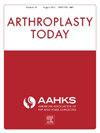Recurrent Guillain-Barré Syndrome After Subsequent Total Knee Arthroplasties
IF 1.5
Q3 ORTHOPEDICS
引用次数: 0
Abstract
Guillain-Barré syndrome (GBS) is an acute immune-mediated inflammatory demyelinating polyneuropathy characterized by symmetrical limb weakness and areflexia. GBS is typically monophasic but may recur in 1%-7% of patients. Many etiologies exist for GBS; one rare associated etiology is surgery, most notably orthopaedic, abdominal, and cardiac surgery. Here, we present a 76-year-old male who developed postsurgical GBS after a right total knee arthroplasty (TKA), 11 years after developing GBS following a left TKA. The patient developed worsening ascending paralysis and, ultimately, respiratory failure requiring tracheostomy. This study reports a rare case of recurrent postsurgical GBS after TKA, possibly triggered by general anesthesia or tourniquet use. Early recognition of postsurgical GBS is imperative to avoid patient mortality.
全膝关节置换术后复发吉兰-巴雷综合征
吉兰-巴雷综合征(Guillain-Barré syndrome,GBS)是一种急性免疫介导的炎症性脱髓鞘多发性神经病,以对称性肢体无力和肢体瘫痪为特征。GBS 通常是单相的,但有 1%-7%的患者可能会复发。GBS 的病因很多,其中一种罕见的相关病因是外科手术,尤其是骨科、腹部和心脏手术。在此,我们介绍一名 76 岁的男性患者,他在接受右侧全膝关节置换术(TKA)后出现了手术后 GBS,而这距离他在接受左侧全膝关节置换术后出现 GBS 已经过去了 11 年。患者的升麻不断加重,最终导致呼吸衰竭,需要进行气管造口术。本研究报告了一例罕见的 TKA 术后 GBS 复发病例,可能是由全身麻醉或使用止血带引发的。要避免患者死亡,必须及早识别手术后 GBS。
本文章由计算机程序翻译,如有差异,请以英文原文为准。
求助全文
约1分钟内获得全文
求助全文
来源期刊

Arthroplasty Today
Medicine-Surgery
CiteScore
2.90
自引率
0.00%
发文量
258
审稿时长
40 weeks
期刊介绍:
Arthroplasty Today is a companion journal to the Journal of Arthroplasty. The journal Arthroplasty Today brings together the clinical and scientific foundations for joint replacement of the hip and knee in an open-access, online format. Arthroplasty Today solicits manuscripts of the highest quality from all areas of scientific endeavor that relate to joint replacement or the treatment of its complications, including those dealing with patient outcomes, economic and policy issues, prosthetic design, biomechanics, biomaterials, and biologic response to arthroplasty. The journal focuses on case reports. It is the purpose of Arthroplasty Today to present material to practicing orthopaedic surgeons that will keep them abreast of developments in the field, prove useful in the care of patients, and aid in understanding the scientific foundation of this subspecialty area of joint replacement. The international members of the Editorial Board provide a worldwide perspective for the journal''s area of interest. Their participation ensures that each issue of Arthroplasty Today provides the reader with timely, peer-reviewed articles of the highest quality.
 求助内容:
求助内容: 应助结果提醒方式:
应助结果提醒方式:


